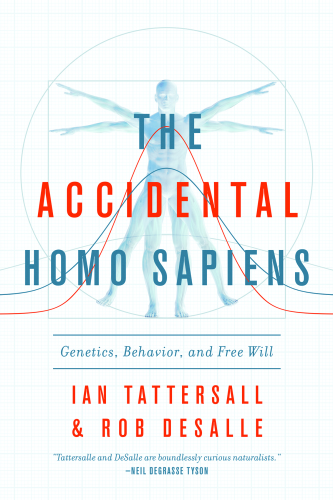
The Accidental Homo Sapiens
Genetics, Behavior, and Free Will
کتاب های مرتبط
- اطلاعات
- نقد و بررسی
- دیدگاه کاربران
نقد و بررسی

February 11, 2019
The central question addressed in this thoughtful but overly complex book is “What sets humans apart from the rest of the natural world?” Tattersall and DeSalle, curators at the Museum of Natural History, argue that the use of symbols, coupled with “something qualitatively unusual about the way in which Homo sapiens process information,” affords a way of viewing the world—typified by a concern with the future—unlike that of any other species, and allows for unrivaled behavioral plasticity. They lay this argument’s statistical foundations in the first two, sometimes heavy-going, chapters. In the three subsequent, more reader-friendly, chapters, the authors posit that while biological evolution has effectively ceased in Homo sapiens, it’s been replaced, thanks to the ability to adjust behaviors, by cultural evolution, “a restless technological and intellectual probing of our cognitive limits, with old ideas and technologies going out of fashion and new ones being introduced at an increasing tempo.” While Tattersall and DeSalle present some fascinating ideas—such as that humanity’s wide behavioral repertoire is tantamount to free will—the demanding nature of this book will largely restrict its audience to those already well-versed in evolutionary theory. Agent: Don Fehr, Trident.

February 15, 2019
A lively addition to the literature on the "unfathomable mystery" of human beings.With the genetics revolution in full swing, a steady stream of books explains the role heredity plays on our development and behavior with the proviso (most authors agree) that it is not the sole influence. In their contribution to the genre, Tattersall and DeSalle (co-authors: A Natural History of Beer, 2019, etc.), both scientists at the American Museum of Natural History, deliver a highly learned lesson in what we do and don't inherit from our parents. "We all come into the world," they write, "with the potential to absorb any language or set of cultural norms...yet by an early age, we may have absorbed an unshakeable perspective on the world that is completely incompatible with that of members of other societies (or even, occasionally, of our own)." Genes have a great deal to do with this, so the authors rock no boats by beginning with Gregor Mendel, whose discovery of simple, single gene inheritance has the advantage of being easy to understand but the disadvantage of explaining little because essentially all inherited traits result from the complex interaction of many genes. Discoveries of the gene for (...homosexuality, violence, religion, IQ, etc.) make headlines but turn out to be wrong. Evolution proceeds through the selection of organisms whose traits give them a reproductive advantage. Plenty of brilliant researchers have contributed to understanding this process, and the authors show little patience with a few whose theories and books seem to simplify matters and have convinced many colleagues. These include works that attempt to explain evolution as the result of competition between units of heredity--e.g., Richard Dawkins' The Selfish Gene. Tattersall's legions of fans will recognize his contribution in the eloquent history of the evolution of Homo sapiens, both in body and brain. Genomicist DeSalle delivers an intelligent lesson in the basics of heredity and population genetics, although readers will have to pay close attention.A concise and useful book of evolutionary science.
COPYRIGHT(2019) Kirkus Reviews, ALL RIGHTS RESERVED.

























دیدگاه کاربران